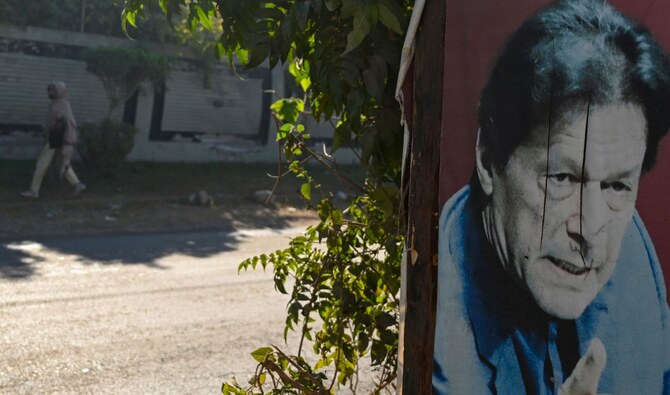ISLAMABAD: Former Prime Minister Imran Khan has announced his refusal to engage with the “establishment or government,” according to a message from prison shared by his sister on Wednesday, warning that his party is ready to proceed with another public rally on September 22, even without official permission.
Khan’s Pakistan Tehreek-e-Insaf (PTI) party held a rally on the outskirts of Islamabad on Sunday, demanding his release from prison after his arrest over a year ago on multiple charges, which he claims are fabricated to keep him out of power. Clashes broke out between his supporters and the police on the day of the rally, with a top PTI leader and Chief Minister of Khyber Pakhtunkhwa, Ali Amin Gandapur, warning the government to release Khan within two weeks or his party would free him from jail on its own.
This was followed by a police crackdown on PTI lawmakers, who were arrested from the parliament building, prompting the party to announce a nationwide protest on Friday.
In his message, Khan said the “establishment,” a euphemism for the country’s powerful military, had previously asked to postpone his rally from August 22 to September 8, citing intelligence reports of security threats.
“They gave their reassurance for complete facilitation if the jalsa [rally] was shifted to 8th September,” the ex-premier’s message, shared by his sister Aleema Khanum on social media, said. “Instead, they placed thousands of containers across every entry point into Islamabad.”
Objecting to the dispersal of his party supporters with tear gas and the arrest of lawmakers from parliament, he said, “There will be no further talks with the establishment or government.”
“Rest assured,” he continued, “We will go ahead with the jalsa on [September] 22. NOC [no-objection certificate] or no NOC.”
Khan’s party had already announced a rally in Pakistan’s eastern city of Lahore on September 22.
His message comes after PTI leaders held a news conference on Tuesday, saying they would take their party’s political struggle to the streets, apart from fighting legal and political battles in court and parliament.
Imran Khan says no more talks with military or government, announces rally on Sept. 22 - family
https://arab.news/5ppgg
Imran Khan says no more talks with military or government, announces rally on Sept. 22 - family

- Khan says the ‘establishment’ asked him to postpone Islamabad rally from Aug. 22 to Sept. 8 for security reasons
- He maintains they promised to facilitate the rally in return, but instead blocked all roads leading to the venue
Pakistan expresses solidarity with Canada as school shooting claims 9 lives

- At least 9 dead, 27 wounded in shooting incident at secondary school, residence in British Columbia on Tuesday
- Officials say the shooter was found dead with an apparent self-inflicted gunshot wound after the incident
ISLAMABAD: Pakistan’s Prime Minister Shehbaz Sharif on Wednesday expressed solidarity with Canada as a high school shooting incident in a British Columbia town left at least nine dead, more than 20 others injured.
Six people were found at the Tumbler Ridge Secondary School while a seventh died on the way to the hospital, the Royal Canadian Mounted Police (RCMP) said in a statement on Tuesday. Two other people were found dead at a home that police believe is connected to the shooting at the school. A total of 27 people were wounded in the attack.
In an initial emergency alert, police described the suspect as a “female in a dress with brown hair,” with officials saying she was found dead with an apparent self-inflicted gunshot wound.
“Saddened by the tragic shooting in Tumbler Ridge, British Columbia,” Sharif wrote on social media platform X.
He conveyed his condolences to the families of the victims, wishing a swift recovery to those injured in the attack.
“Pakistan stands in solidarity with the people and Government of Canada in this difficult time,” he added.
Canadian police have not yet released any information about the age of the shooter or the victims.
Canadian Prime Minister Mark Carney said he was “devastated” by the violence, announcing he had suspended plans to travel to the Munich Security Conference on Wednesday.
While mass shootings are rare in Canada, last April, a vehicle attack that targeted a Filipino cultural festival in Vancouver killed 11 people.
British Columbia Premier David Eby called the latest violence “unimaginable.”
Nina Krieger, British Columbia’s minister of public safety, described it as one of the “worst mass shootings” in Canada’s history.










